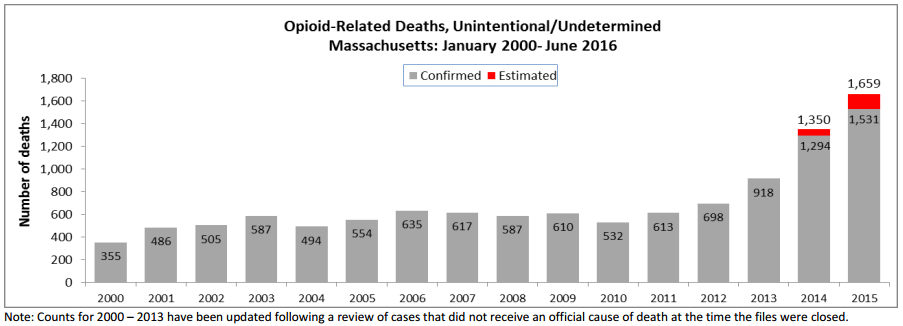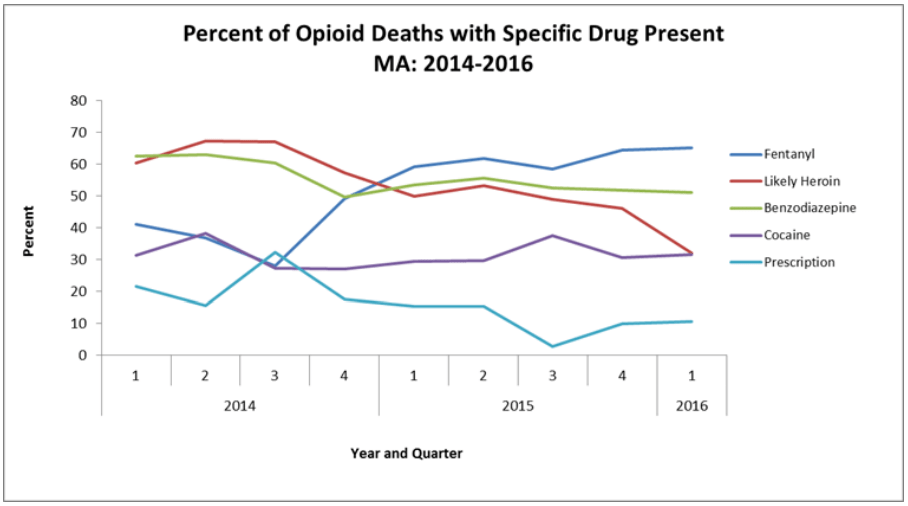Advertisement
New Numbers Show Opioid Epidemic Rages On In Massachusetts
The opioid epidemic is getting worse, not better, in Massachusetts. More men and women died after an unintentional overdose in the first six months of 2016 than during the same period last year, according to the Massachusetts Department of Public Health (DPH). And the state has revised the total number of deaths last year: up. Just over four people died, on average, every day.
"We continue to face an unprecedented opioid epidemic with the numbers continuing to rise," Dr. Monica Bharel, DPH commissioner, said.

For a snapshot of just how bad things are, take a look at June, the most recent month for we have data. There were an estimated 173 suspected overdose deaths across the state this year, as compared to 106 in June of last year.

These sobering charts are no surprise to doctors and other medical professionals who treat overdose patients daily.
"We're seeing an ever-increasing number of opioid overdoses," said Dr. Kavita Babu, who treats patients in the emergency room at UMass Memorial Medical Center and is an associate professor of medical toxicology in the department of emergency medicine at UMass Medical School.
Babu says many of the patients she helps bring back to life are surprised when they wake up in a hospital.
"They feel like they've used their usual dose," Babu said. The problem: when fentanyl is mixed with or replaces heroin.
"Patients are finding vast differences in the potency or strength of the drugs they are getting on the street," she said.
Those stories fit the state data. Deaths attributed directly to heroin are down, but fentanyl was present in 66 percent of confirmed overdose deaths in the first six months of 2016.
Advertisement

There is no easy way to test for the presence of fentanyl on the street. Babu and other physicians urge addiction patients to cut their dose in case the brown powder they are cooking includes fentanyl. But even a tiny amount can be lethal. And the 4 milligram dose of naloxone sold over the counter is not strong enough to reverse most overdoses caused by fentanyl. State data may reflect this. EMS crews used naloxone 1.4 times with patients, on average, because it appears they needed more of the drug to reverse the effects of fentanyl.
A state report sent to the Legislature in July says that 83 percent of overdose deaths are from drugs obtained illegally, and some in the addiction community say there is not enough attention to curbing the illegal drug supply.
The Baker administration says both the number of people prescribed opioids and the number of prescriptions is dropping. The state continues to add treatment beds: 64 in Greenfield and 30 at Taunton State Hospital this summer.
But these numbers raise the question: Is all the attention to the opioid epidemic paying off? Is the state spending money effectively?
"It took us a long time to get to this problem," Bharel said, "and it will take us a while, working together, to get out of this."
Some advocates say they are baffled.
"We've been asking for so many years for help and now it's here. We've got an administration that's been amazing," said Joanne Peterson, "and yet it's getting worse."
Peterson, who founded the parent support group Learn to Cope, attended another funeral Tuesday night, one of six in the last month.
"We feel defeated," said Peterson.
Her prognosis: "In the end, sometimes addiction still wins, no matter what. That's what we see."
